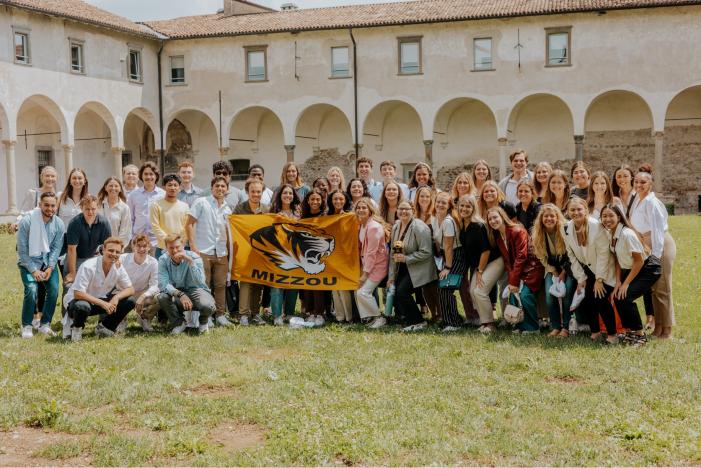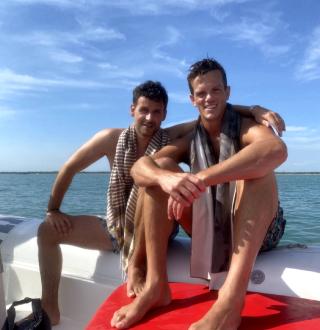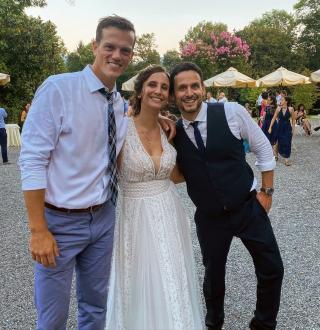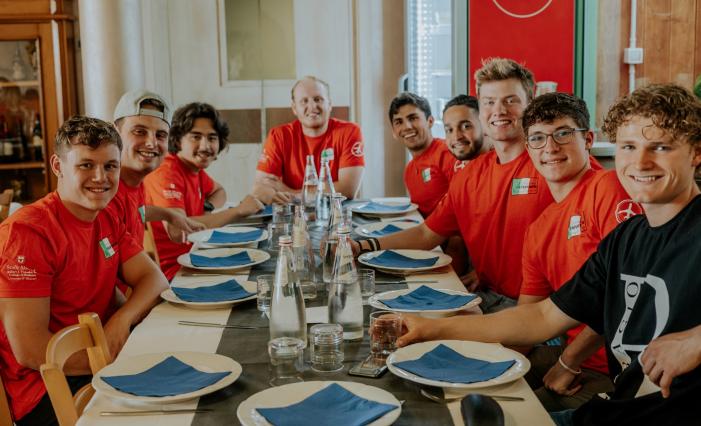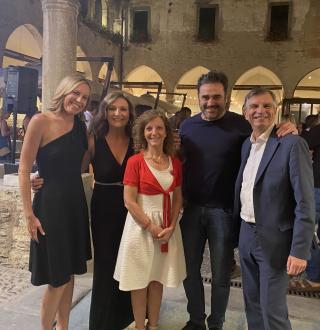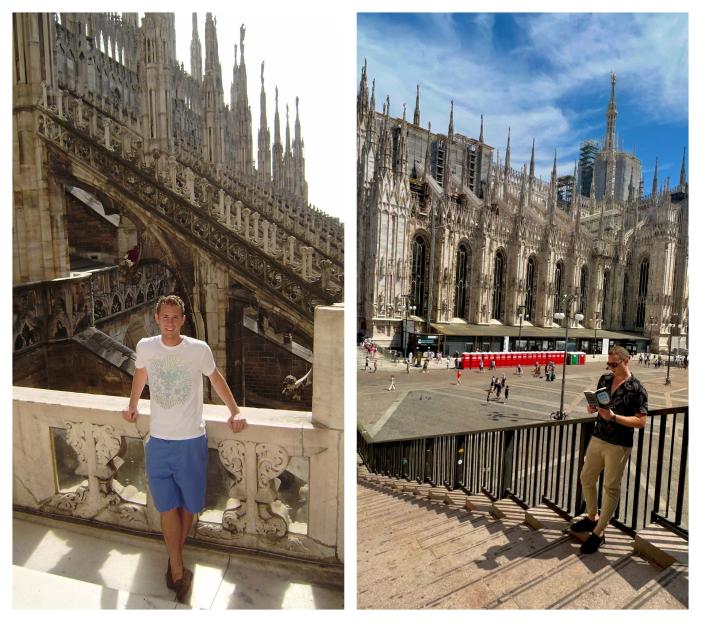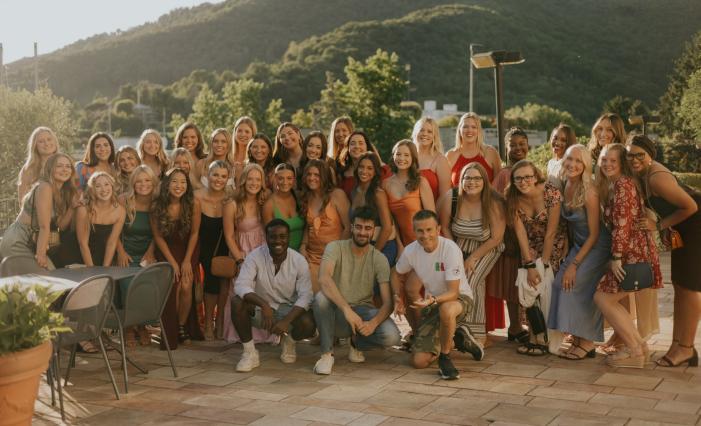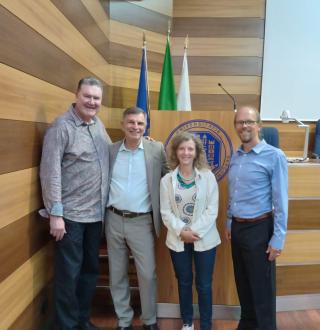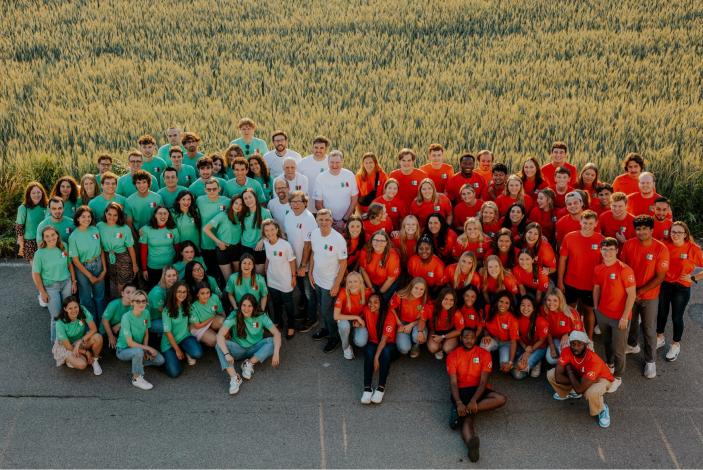
‘A Second Home’: Bergamo partnership continues to thrive 20 years later

Members of the Summer 2022 congregation from the Bergamo summer program gather. The Mizzou students have red T-shirts, with the students from Bergamo in white, and faculty and staff in green.
By Stephen Schmidt
Like many others in Bergamo, Italy, the night of May 23, 2007, began with a dinner party. Pasta, pizza, wine, laughter.
There was a bus to take several students from the Trulaske College of Business into the city’s center, in the middle of the fourth installment of the study abroad partnership between the University of Missouri and the University of Bergamo, which recently celebrated its 20th anniversary.
Bergamo is a rather quiet city — a place not full of tourists but of picturesque backdrops carved by winding, cobblestone streets in the country’s Lombardy region.
“What I love about Bergamo is that our students have the true opportunity to be more immersed in Italian culture,” said Shannon Breske, PhD ’16, who has served as the study abroad director at Trulaske since 2019. “You are living in this town, where not a ton of people speak English, and you do not speak Italian. And I love that. It's a culturally rich opportunity for our students that's different from going to a well-traveled place in Europe.”
On this night, the city wanted to roar in unison with the rest of Italy as the Trulaske students learned one of the fundamental truths of the Bergamo experience: True passion needs no translation.
“From a cultural standpoint, the country was absolutely on fire,” said Andy Butler, BS Acc, M Acc ’09, who was a first-year student manager on the trip.
The bus was met by a sea of Italian flags and flares. Those who held them were particularly emboldened by A.C. Milan’s presence in the Union of European Football Associations (UEFA) Champions League final, taking place in Athens, Greece.
The team — located a little more than an hour from Bergamo — went on to win the most prestigious club soccer tournament that year for its seventh title of its kind. Not being able to move forward due to the foot traffic and revelry, the bus eventually backed out of the city center. Butler sat in the bus, amazed at the sight, before venturing into the crowd with other students to join the watch party for the title game.
“As a small-town, Missouri kid, soccer wasn’t even in my vocabulary. No one has a soccer ball in my town,” said Butler, who is a native of Bethany, Missouri. “I think that year, in particular, was so electric because I could see just how wild and elevated the culture was around an event like that, which contributed to me truly falling in love with the country, the people and the culture.”
Butler first arrived in Bergamo in the summer of 2006 as a sophomore, having only been on a plane one other time for a domestic flight. For three consecutive summers, though, he would serve as a student manager for the study abroad experience at Trulaske.
Those trips led to several others, including one for the wedding of one of his best friends, a Bergamo student named Alberto Pievani, whom he met in 2006. Last summer, he returned to Bergamo to attend the wedding of Pievani’s sister.
“I had the opportunity to connect with local Italian students on a much more personal level,” Butler said, “and to dive into and get a better read on the culture within a very short period. It was a life-changing experience for me, and then I got to see it on the face of everyone else as a manager.”
Over the last two decades, there have been many stories like Butler’s. These are the result of the rare, dynamic blend of equal part Trulaske students and Bergamo students — just as the program’s co-founder, Chuck Franz, hoped.
Franz, who retired from Trulaske as an associate professor in 2015, attended the anniversary event in Bergamo on May 30. Also in attendance was Mauro Cavallone, the marketing professor from Bergamo who partnered with Franz to develop the program — and still oversees all operations from the host university’s perspective.
"We never envisioned that we would go on for 20 years,” said Franz. “I remember when we had the 10th anniversary and thought that was a big deal, and then, all of a sudden, Mauro says we're beginning to plan for the 20th anniversary. There is a sense of accomplishment, real satisfaction and excitement that the program is still working.”
On that night, Franz, Cavallone and others expressed how much the partnership between the institutions meant to them while also exchanging stories and memories. Those who could not attend the event — held at a former Augustinian convent that was converted to an ornate restaurant — made videos ahead of time. Video entries included one from Nina (McLernon) De Chiara, BS BA, BA ’17, and her Bergamo-native husband, Enzo, whom Nina met as a student in the program. The couple now lives in the Chicago area, where De Chiara teaches English as a second language.
"You could tell how much our colleagues in Bergamo took pride in the program itself, and in putting together the program to celebrate the 20 years,” said Professor Ken Shaw from Trulaske’s School of Accountancy. He has taught in the Bergamo program seven times since making his first trip in 2010.
A new approach
The program’s origins can be traced back to Franz talking with Tom Miller, a former finance professor at Trulaske. At the time, Miller was in charge of coordinating the signup for a four-week summer consortium program that was taking place in Paderno, Italy, among approximately 30 universities — and most of the study abroad programs were run out of the International Programs Office at Mizzou.
"‘Hey, Chuck, why are we sending students over there?,’” Franz remembered of the conversation with Miller. “‘We’ve got a connection over there. Why don't we see if we can start a program and send students directly over there and do our own program?’ I said. ‘OK, that sounds good to me.’”
The connection was the late Glenn Pierce, an Italian professor at Mizzou who was friends with a business professor at the University of Bergamo. In 2001, Franz traveled to Bergamo for the first time, meeting with the University of Bergamo’s dean, who put him in contact with Cavallone.
The sense of connection between Franz and Cavallone was instantaneous.
"Mauro had his own business. He was very practical. He was experienced and trained to do marketing,” Franz said. “He was teaching marketing there, and I connected with him a lot because I wanted to create something the students could feel comfortable with. Our conversation was easy because we both had the students’ interests in mind.”
As luck would have it, the University of Bergamo had just taken over a new building that once housed a bank on Via dei Caniana, a main artery in the city, after outgrowing its original campus. The university wanted to expand its programming, making the start of its partnership with Trulaske a timely endeavor.
Franz taught a project management class to the Bergamo students in the summer of 2002, before the first group of Mizzou students arrived with him the following summer.
Finding a (schedule) fit
Franz wanted to find a way to work around the scheduling conflicts that accountancy students, in particular, faced, with upper-level and core sequencing preventing them from participating in a study abroad program for a full semester.
“Chuck was trying to create a space to expand the global mindset of our students, that would allow them to graduate within four years and complete this residential summer program,” Breske said.
Franz devised several other study abroad programs for Trulaske, including those still running in Prague, Czech Republic, and Alicante, Spain. Still, the Bergamo program has always remained unique due to its formatting — an equal group of students from Mizzou and Bergamo choose two classes, taught in English, that spans four weeks.
Each class, consisting of about 40 students from each school, is taught by professors from each institution. What results is a unique immersion experience in which students, who are put into groups, strike up conversations, equally fascinated with the others’ backgrounds while navigating language barriers.
“This is the magic of this story. Italian students meet American students. American professors meet the Italian professors and colleagues,” Cavallone said. In addition to the academic subject they are studying, “Italians start learning in a different language, and Americans start learning some things about us — our language and our culture. The magic is that we have very strong relationships with every professor and student."
Cavallone said that the American students are kind and patient with their Italian counterparts in the classroom when it comes to finding the right words in English to convey their ideas. “They help each other,” he said. “They respect each other.”
“We got acquainted really fast,” said Desiree Norfleet, a senior from Independence, Missouri, who is in the fourth year of Trulaske’s 150-hour accountancy program. “It was really fun because you get to learn about their classes and who they are as people.”
Norfleet said that the classroom experience — and the other social programming, including the highly anticipated “castle party” at Castello di Clanezzo — helped her quickly overcome her usual shyness when meeting new people. In addition, those newfound skills of navigating social situations will benefit her last two years at Trulaske.
“I'm going to have to step out of my comfort zone,” she said, “And I'm going to have to push myself to network and get out there with other students, and not just be comfortable with talking with my friends, so the Bergamo program was a great start.”
Courtney Cothren, associate teaching professor at Trulaske, taught two weeks of Marketing 3901 last summer, with Associate Teaching Professor Joel Poor teaching the other two weeks. She said her favorite aspect of teaching the course was observing how American and Italian students worked together in groups.
“Italian students would invite American students over to meet their families and have dinner,” Cothren said. “It was fun to listen to their conversations as they were working on projects with the Italian perspective versus the American perspective.”
This was Cothren’s first trip to Bergamo to teach in-program, but she co-taught the course with Cavallone remotely the previous year to bridge the in-person experiences during the hiatus caused by COVID-19.
Added Shaw: “That is a selling point of our program, working with students from different countries who come from different cultures. It's a learning process for us also as professors."
Time to explore
When designing the format for the Bergamo program, Franz knew that the trip's educational value for the Mizzou students would only be partly tied to the classroom. The rest of the learning would happen outside the classroom while students — many of whom had never traveled abroad — learned to navigate foreign countries.
To allow for plenty of travel and see the wonders of Europe, the program was formatted to hold classes three days a week.
“Both Mauro and I believed that the American students were going to grow up fast, having to make their own plans,” Franz said. “They would take off for three to four days on the weekend, make plans, and deal with issues like missing a flight or a train or losing a hotel reservation.”
Added Butler: "You have difficult situations. You're trying to navigate trains in a foreign language or trying to book hostels as a big group. You're trying to be frugal but still have a lot of fun. There's just so much that you learn about yourself personally.”
Mike Swigunski, BS BA ’11, was one of the students who grew up fast while booking trips across Europe. The St. Louis native went to Bergamo as a sophomore in the summer of 2009, having only traveled internationally to Mexico for a family vacation beforehand. What he discovered at the end of his first trip was mainly himself.
"You're in a small town in Italy. You're going to people’s houses,” Swigunski said. “You're learning about Italian culture and how they do everything in life. And that was just really eye-opening to me. I gravitated towards that experience because it was a liberating moment.”
Swigunski learned he had a knack for planning and booking travel arrangements by getting his fellow students on the right trains and finding the best lodging.
He went on to become a student manager for the study abroad experience in Prague before deciding to fully embrace a nomadic lifestyle in which he travels throughout the world while running a collection of remote ventures. He is also known for having written a book, “Global Career: How To Work Anywhere and Travel Forever.” Although he is based in Tbilisi, Georgia, he has traveled to 102 countries to date.
“Going to college really opened the door to how much is out there and how beautiful the world is,” said Swigunski, who credited Franz as being a key mentor who helped shape his career path. “And I just wanted to keep exploring.”
Managing it all
The Bergamo trip also played a key role in how study abroad experiences at Trulaske are conducted, because it introduced the concept of a student manager. Student managers work behind the scenes to get anything professors may need, and help students in various ways, including facilitating WiFi and ensuring they have adequate transportation back to the hostel after being out and about at night.
It's a job that is well worth it. To this day, Butler — who works as a director at a private equity fund, CPC Management, in Kansas City — is stopped from time to time by students who went on a Trulaske trip for which he served as a student manager. “They always come up to me and say, 'You were a big part of one of the greatest experiences and one of the coolest trips that I've ever been on in my life,’” he said.
Furthermore, the student manager experience also helped him hone his leadership skills while allowing his confidence to grow in new situations. When he graduated from Trulaske, he worked for both KPMG and BKD before joining his current employer. He was chosen for a three-week training program in Milan because of his experiences as a student manager on study abroad trips.
“These programs helped shape my personality and gave me a lot of confidence to go into an interview and be comfortable speaking, developing a team, working in a team,” Butler said.
Rolling along
As evidenced by the 20th anniversary, there is no sign of the partnership between the universities stopping any time soon.
“I hope that this will become a long-life program for our university, and that we can work to increase other possibilities,” said Cavallone, who mentioned there were plans in the works to send his students to Columbia in a more traditional exchange program.
Those who have taught and learned there strongly encourage others participate in the program.
“It has these carryover effects that impact how you teach over here,” Shaw said. “Anytime you go somewhere internationally, you build more cultural awareness and understanding, and you bring that back with you as well. I think it makes you a better person and teacher."
Added Cothren: “You're teaching students who want to be there and are excited to be in the classroom and work together to come up with fresh ideas. Just like it gives students a different perspective, I think it gives me a different perspective, too. Looking at different cultures, different companies and different examples helps my lectures here as well."
Norfleet said that every Mizzou student should consider a study abroad experience “a must.”
“You learn so much about yourself and so much about different cultures and their work environment,” she said. “There is just so much to learn and so much to see.”
In recent years, Swigunski has started a scholarship for Trulaske students who want to go on their first study abroad experience, knowing what a pivotal moment those trips have played in his life. He said there are always outlets for financial support if students know the right places to look.
“There are definitely ways to make it happen,” he said. “Don't let the financial reason be a limiting factor. If you're studying business, it's an easy decision because you're basically paying the same amount as you would for college credit — but you're also getting a cultural experience. I think Mizzou has the perfect package there, and they just have to keep doing what's working so well."
According to Franz, the recipe for the program’s longevity has been quite simple: Put in equal parts passion and respect. And mix.
"It was the passion that both Mauro and I had for the students,” Franz said, “and the genuine respect that we — and our colleagues and students — have had for each other about the contributions that we can bring to the program.”
Learn more about Mike Swigunski and his path to a global career.
